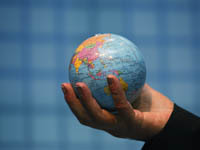The law of the subterranean
By Kamal Wadhwa

Any emergence of a new international economic order to redress the disparities of wealth and opportunity between the North and South hemispheres must stress upon equal access to the vast reserves of untapped mineral wealth located in the Earth's interior.
To match territorial, space and laws obtaining on the high seas, a system to govern and adjudicate the exploitation of wealth found in the bowels of the Earth must now find root among nations who are still disposed to view international law as a viable means to obtain justice however limited its practical benefits might seem.
Lawmakers across the globe must now plan and formulate theirs concepts into an International Law of the Biosphere or more aptly, the International Law of the Subterranean to adjudicate and decide conflicting claims to scarce, often precious, resources found in the Earth's interior.
A body of laws is needed to map the Earth's interior not only to determine how and when nations will have access to natural resources individually, jointly or severally, but also to set limits and restraints on wanton and senseless exploitation of such resources by strong and wealthy nations in detriment to the new economic order they deem to be their goal.
Inasmuch as the Earth's surface, its ocean and skies, have been mapped minutely, meticulously and in detail by geographers, oceanographers and airmen, it is now incumbent upon modern man to look below himself into the hidden recesses of the subterranean world from which he proposes to enrich himself in the coming decades of resource scarcity.
In an atomic age where more and more nations are seeking the wherewithal to power their industries and fuel their defense projects, a premium is placed on finding mineral and chemical wealth within the Earth.
In brief, it is now time to turn our attention to the neglected quadrants of the earthly sphere and farm them judiciously to ensure plenitude and abundance for all nations. National states must now achieve international comity and covenant with one other to ensure that not all resources are expended so quickly and wantonly by strong and wealthy nations so as to deprive the poorer and weaker nations of a meaningful future.
International comity is needed to guarantee that those nations that lack mineral wealth and natural resources will be accorded a modicum of such wealth in order to meet legitimate needs of survival. In practical terms, this means that resource reservoirs or mineral banks will be set up to apportion rare and scarce resources to benefit all nations equally.
Nations not in immediate need of fossil fuels or rare metals may divert or postpone their consumption, thereby guaranteeing themselves a richer future. In a world that is increasingly demanding immediate and instant gratification, tests of international morality will soon acquire an economic and material dimension as resource poverty follows in the wake of profligate and adventurous schemes of resource expenditure.
The organs of delivering international justice such as the World Court at The Hague must now not only adjudicate and arbitrate disputes between member nations, but also find ways to prevent costly litigation over claims to covert resources found in the Earth's interior. The World Court must also direct research under its auspices to draw up and implement a system of rules and regulations binding on all nations that subscribe to international law.
Prior to setting up universal and binding guidelines to regulate the farming of resources in the Earth's interior, the scientific and educational arms of the United Nations must study the prospects of channeling warring nations into separate and distinct developmental paths to eliminate competition over commonly desired resources. In practical terms, it would become desirable for each nation to choose its own peculiar developmental mode and the appropriate economic stance to achieve it.
The propaganda organs and the information media in each country must attempt to influence the public to adopt a lifestyle that is more conducive to economizing on consumption of natural resources in the interests of preserving world peace.
Education imparted to youth in the developed countries, in particular, must wean them away from the false notions of economic progress they have inherited from their forefathers. North and South must come together in a common forum to set up a new international economic order based on principles of justice and equity.
Kamal Wadhwa is an Honors graduate in Literature from the University of Chicago and former Assistant Editor of Lex et Juris - The Law Magazine. He can be reached at [email protected]
Subscribe to Pravda.Ru Telegram channel, Facebook, RSS!


